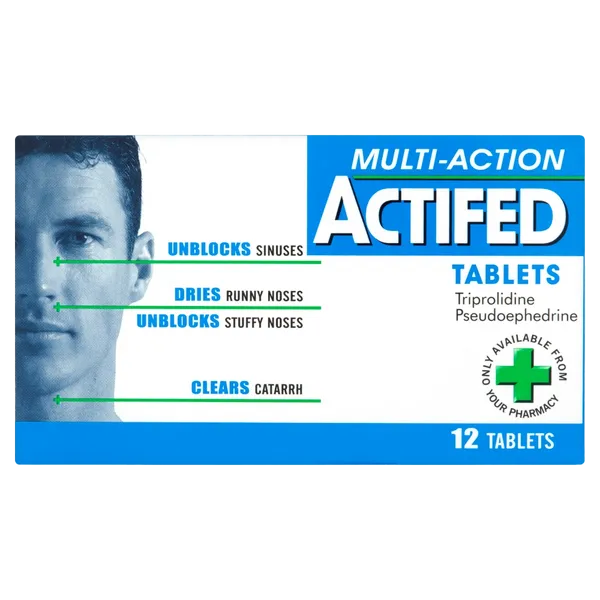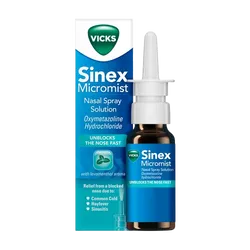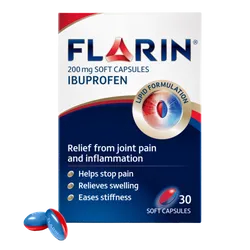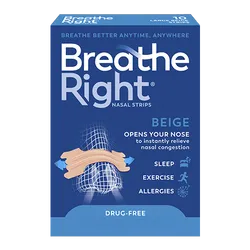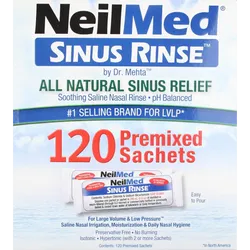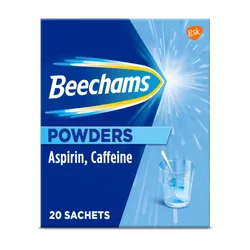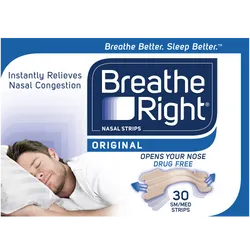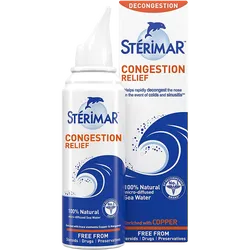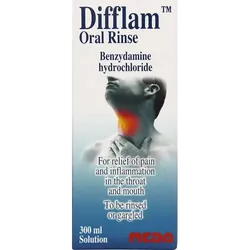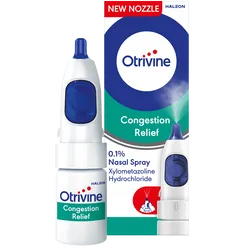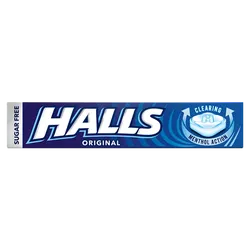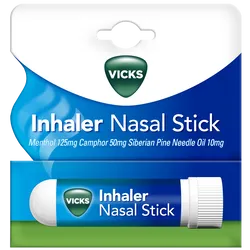If anyone has taken too many tablets contact a doctor or your nearest Accident and Emergency Department (Casualty) taking the leaflet and pack with you.
If you forget to take a dose, take the next dose when needed provided that the last dose was taken at least 4 hours ago. Do not take a double dose.
Do not take this medicine:
- If you have very high blood pressure (severe hypertension) or hypertension not controlled by your medication or severe heart disease.
- If you have ever had a bad reaction to any of the ingredients.
- If you are taking, or have taken in the last two weeks, drugs for depression known as Monoamine Oxidase Inhibitors (MAOIs) or Reversible Inhibitors of Monoamine Oxidase (RIMAs).
- If you are taking furazolidone (an antibacterial agent).
- If you are taking beta blockers (used to treat high blood pressure).
- If you are taking stimulants or appetite suppressants and drugs used to treat congestion and asthma (sympathomimetic drugs).
If any of these apply to you, get advice from a doctor or pharmacist without taking Multi-Action Actifed Tablets.
Talk to your doctor or pharmacist:
- If you have liver or kidney problems.
- If you have high blood pressure or heart disease.
- If you have diabetes or if you have been told by your doctor that you have an intolerance to some sugars.
- If you have an overactive thyroid gland.
- If you have glaucoma (increased pressure in the eye).
- If you have prostate problems (difficulty with passing water or needing to pass water often).
- If you have alcohol dependence.
- If you have bronchitis, emphysema or asthma.
- If you have blocked arteries or veins (occlusive vascular disease).
- If you are being treated for a thyroid disorder.
Speak to your doctor if you are taking any other medicines, including:
- Hypnotics (sleeping tablets including barbiturates).
- Opioid analgesics (drugs used to relieve pain e.g. codeine, tramadol, morphine).
- Antipsychotics (drugs used to treat mood disorders).
- Sedatives (drugs used to treat anxiety and tension).
- Anticholinergic drugs (drugs used to treat cramps or spasms such as atropine).
- Antihypertensives (drugs used to treat high blood pressure such as guanethidine, methyldopa, adrenergic neurone blockers, debrisoquine, bretylium and betanidine).
- Tricyclic antidepressants (used to treat mood disorders).
- Moclobemide (used to treat mood disorders).
- Cardiac glycosides (drugs used to control heart rhythms or contractions such as digoxin).
- Ergot alkaloids (drugs used to treat migraine such as ergotamine and methysergide).
- Oxytocin (drugs used to help contractions during childbirth).
If you are not sure about any of the medicines you are taking, show the bottle or pack to your pharmacist.
Ask your doctor or pharmacist for advice before taking this medicine if you are pregnant or breast-feeding.
This medicine may cause drowsiness. If affected, do not drive or operate machinery. Avoid alcoholic drink.
Some of the ingredients can cause problems
This medicine contains lactose. If you have been told by your doctor that you have an intolerance to some sugars, contact your doctor before taking this medicine.
If any of these bullet points apply to you now or in the past, talk to a doctor or pharmacist.
If you experience any of the following, stop using this medicine and talk to your doctor immediately and contact your doctor:
- A feverish generalised redness of the skin (erythema) associated with pustules (Acute Generalized Exanthematous Pustulosis - AGEP).
- Sudden severe headaches, nausea, vomiting, confusion, fits, visual disturbances.
- Sudden abdominal pain or rectal bleeding due to inflammation of the colon (ischaemic colitis).
- Sudden loss or reduction of vision due to reduced blood flow to your optic nerve (ischaemic optic neuropathy).
- Feeling unusually tired, unexpected bruising or bleeding and getting more infections (such as colds) than normal.
- Reduced blood flow to the heart which can cause angina (discomfort or pain in the chest, neck, back, jaw, shoulders or arms), or heart attack.
- Stroke (weakness of the face, arms or legs, or speech problems).
- Swelling of the face, lips, mouth, tongue or throat which may cause difficulty in swallowing or breathing.
- Allergic reactions including skin rashes such as hives (which may be severe and include blistering or peeling of the skin) and itching.
- Hallucinations or paranoid delusions (seeing or hearing things that are not there, irrational thoughts or feelings).
- Serious conditions affecting blood vessels in the brain known as posterior reversible encephalopathy syndrome (PRES) and reversible cerebral vasoconstriction syndrome (RCVS). Stop using Multi-Action Actifed Tablets immediately and seek urgent medical attention if you develop symptoms that may be signs of PRES or RCVS. These include: severe headache with a sudden onset, feeling sick, vomiting, confusion, seizures, changes in vision, a fast or irregular heartbeat, anxiety, restlessness, irritability or feeling jittery or feelings of extreme happiness, tingling or numbness of hands or feet (Pins and needles).
Other effects which may occur include:
- Very common (may affect more than 1 in 10 people): Headache.
- Common (may affect up to 1 in 10 people): Difficulty sleeping, nervousness, dizziness, difficulty performing tasks, drowsiness, blurred vision, thickened mucus, dry mouth or nausea.
- Rare (may affect up to 1 in 1000 people): Confusion or depression, tremors, shakiness or slurred speech, low blood pressure, an increased awareness of the heartbeat (palpitations), sleep disturbances.
- Other effects which may occur but it is unknown how often: High blood pressure, nose bleeds, dry nose or dry throat, stomach pain or vomiting, pain when passing water, feeling tired.
- Trouble passing water (especially in men with prostate problems).
If you get any side-effects, talk to your doctor, pharmacist or nurse. This includes any possible side-effects not listed in this leaflet. You can also report side-effects directly via the Yellow Card Scheme at www.mhra.gov.uk/yellowcard or search for MHRA Yellow Card in the Google Play or Apple App Store. By reporting side-effects, you can help provide more information on the safety of this medicine.
Store below 25°C.
Store in the original package to protect from light and moisture.
Keep the product out of the reach and sight of children.
Do not use after the end of the month shown as an expiry date on the packaging.
Medicines should not be disposed of via wastewater or household waste. Ask your pharmacist how to dispose of medicines no longer required. These measures will help to protect the environment.
